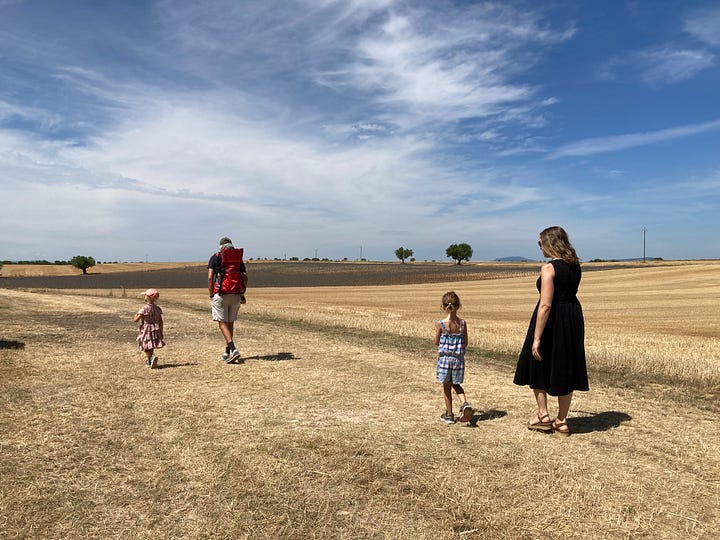Bonjour dear readers,
I hope that your summer was a treat as ours was. We got in the family time we needed, taking advantage of the beaches and going on a little vacation to the Cher region to explore castles, and gardens, and above all, to take in a little peace and quiet.


This summer we also tried something new with the youth of our church that we called “Parole et Pancakes” (Word and Pancakes). Four times over the summer, we invited the middle school and high school students from church to our house to eat real American pancakes and do a Bible study. The theme for the studies was a comparison of worldviews, and together we took a look at atheism, scientism, Islam, and Buddhism. The kids approached the studies with interest and the pancakes with the hunger of a wolf (as we say here), and Chelsea and I are very happy with the time of fellowship and spiritual growth that it turned out to be.
What’s that for?
We were in the park St. Mitre having our picnic when I saw him. There’s a quiet spot over there that we like where there’s a low wall under a large tree; we can all go there together by bike to eat al fresco. Usually, we don’t see many people there, but occasionally someone passes by, and this time it was an older man walking straight toward us with a curious stick in hand. He didn’t say anything to us, but he set his stick down and looked up into the tree. It was the stick that caught my attention: it was about 6 feet long, it had three little sticks on one end like fingers, and I had no idea what it was for. I wasn’t left in the dark for long though, because the man quickly picked his stick back up and started using it… to pick figs from the branches of the tree.
This experience made me think about the fact that you can’t understand something if you don’t know what its purpose is. As long as I didn’t know the purpose of the fig-picker, I couldn’t understand it. I could clearly see its shape, size, material — but none of that could tell me what it was. For another example: you could study every detail of a traffic light, all its parts and electrical components, but if you don’t figure out that red means stop and green means go, then you know less about it than a four-year-old. If in your imagination a traffic light has the same purpose as Christmas lights, nothing else you know about it is of any value.
And yet, when we start doing science, we act as if the reason why the things we study exist is of no importance for understanding them. We analyze the chemical composition of stars at the other end of the galaxy, but we miss the fact that “The heavens declare the glory of God” (Ps 19:1). We dive into the sea to uncover the secrets of the beasts of the sea, but fail to understand that they were “formed to play in it” (Ps 104:26).
Imagine that some alien linguists came to study the English language. Being very gifted, they quickly broke down all the rules of grammar, phonetics, and syntax — but there was one thing they didn’t notice. They didn’t realize that English words have meaning, and that English speakers use them to talk about the world around them. These linguists know that the word “dog” is a noun and that it’s linked to words like “bark” and “puppy,” but they didn’t perceive the link between the word spoken by humans and the flesh-and-blood animals that accompany them.
Maybe that’s an absurd thing to imagine — but what about us then, who fill libraries with our detailed knowledge of the works of God’s hands, and yet completely miss their message, and haven’t even noticed that they speak, and that they testify to the God who created them?
Reading
I didn’t get through all the reading I had ambitiously planned for the summer, but among what I did read, the most interesting was Les sciences du langage et l’étude de la Bible by Sylvain Romerowski. Linguistics already gets me excited, and the direct applications to the study of the Bible are very helpful for correcting a lot of the misconceptions we hear in sermons or read in commentaries. If you don’t read French, there’s God, Language and Scripture by Moisés Silva, which I haven’t read, but Silva is one of Romerowski’s main influences.
The most improbable moments in cycling
You don’t need to be a cycling fan to enjoy these clips — for example at 3:32, when a cyclist gets taken out by an inflatable arch!
~
I will say to the north, Give up, and to the south, Do not withhold; bring my sons from afar and my daughters from the end of the earth, everyone who is called by my name, whom I created for my glory, whom I formed and made.”
Isaiah 43.6-7


